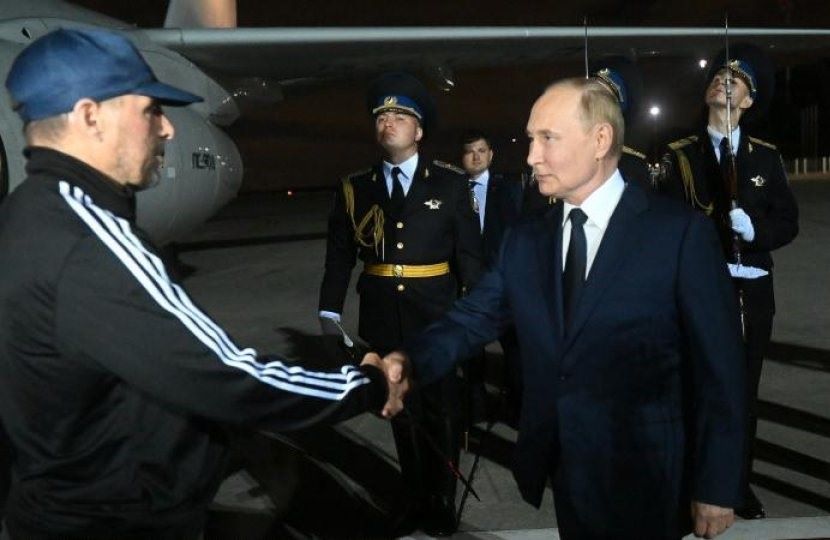Kremlin’s “hostage diplomacy” pays off: ex-FSB assassin Krasikov returns to Moscow
A former officer with the Russian Federal Security Service (FSB) who was imprisoned for a contract killing in Germany – along with other convicted Russian criminals – returned home after the largest prisoner swap after the World War Two on 1 August 2024.
The exchange took place in Ankara and involved 26 people: 10 were sent to Russia, 13 to Germany, and 3 to the United States. For the 16 political prisoners, Russian leader Vladimir Putin released he has received 10 killers, thieves, and spies who had been caught red-handed in the West. The prisoners were flown to Turkey on seven planes: two from the U.S., and one each from Germany, Poland, Slovenia, Norway, and Russia.
More to read:
Putin pardons a second convicted cannibal, drafts him for war in Ukraine
Additionally, German citizen Rico Krieger, who was sentenced to death in Belarus and later pardoned by Alexander Lukashenko, was also freed.
The operation was conducted at Esenboğa Airport with the mediation of Turkey's National Intelligence Organization (MIT).
These are the names of Russian politicians and American citizens imprisoned in Russian:
• The Wall Street Journal correspondent Evan Gershkovich
• Politician Vladimir Kara-Murza
• Former head of Alexei Navalny's campaign office in Ufa, Liliya Chanysheva
• Politician Ilya Yashin
• Former head of Navalny's campaign office in Tomsk, Ksenia Fadeyeva
• Politician and former director of "Open Russia" Andrey Pivovarov
• Former US Marine Paul Whelan
• Radio Free Europe/Radio Liberty journalist Alsu Kurmasheva
• Former co-chair of the Memorial Center Oleg Orlov
• Artist Sasha Skochilenko
• 19-year-old Kevin Leek, convicted for "treason"
• Cycling activist German Moises
• Former head of Navalny's campaign office in Barnaul, Vadim Ostanin
The exchange list also included Patrick Schebel, a German citizen falsely accused of drug smuggling, and political scientist Dieter Voronin but their release had not been confirmed.
More to read:
Russian court sends to prison physicist who designed hypersonic missiles for Putin
The Kremlin published a decree by Vladimir Putin pardoning the prisoners released as part of the deal.
The West, in turn, handed over eight prisoners to Russia. Their names are:
• Vadim Krasikov, convicted in Germany for murder
• Artem Dultsev, convicted in Slovenia for espionage
• Anna Dultseva, convicted in Slovenia for espionage
• Mikhail Mikushin, accused of espionage by Norwegian authorities
• Pavel Rubtsov, alleged GRU agent
• Roman Seleznev, sentenced to 27 years in the U.S. for stealing bank card data
• Vladislav Klyushin, convicted in the U.S. for hacking computer networks
• Vadim Konoshenok, alleged FSB agent
Artem and Anna Dultsev have two children who returned to Russia with their parents.
Central in this operation was Vadim Krasikov, a former FSB officer who had been sentenced to life in Germany. In 2021, he was found guilty of murdering former Chechen field commander and Georgian citizen Zelimkhan Khangoshvili in broad daylight. Putin publicly defended the killer as a “devoted patriot” and demanded his release. On arrival in Moscow, Krasikov was welcomed by Putin in person, with military honors.

Another figure who had been initially included in the swap list is Alexei Navalny, according to the former head of Navalny's campaign offices Leonid Volkov.
"This is the same exchange in which, as we hoped, Navalny was supposed to be released in February this year. […] But Putin decided not to free Navalny. He literally killed him a couple of days before the planned exchange could take place," Volkov said on social media.
Navalny died on 17 January 2024 in a high-security prison in Russia’s Arctic region. He was considered a personal enemy of the Russian dictator.
The so-called “hostage diplomacy” – when a government jails innocent people including foreigners to use them as leverage at negotiations – is a practice Moscow has been using very often since the occupation of Crimea in 2014. On 1 August ten years later, it paid off well for Putin.
Sources: Meduza, BBC, RFE/RL
***
NewsCafe is an independent outlet that cares about big issues. Our sources of income amount to ads and donations from readers. You can support us via PayPal: office[at]rudeana.com or paypal.me/newscafeeu. We promise to reward this gesture with more captivating and important topics.







